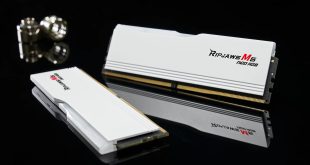The world of modern technology requires a balancing act. You must control costs, otherwise you can't make a profit – while at the same time you need to innovate like there is no tomorrow or there won't be a tomorrow. At CES, the world's second largest memory module producer has some cool new stuff on show. KitGuru closes one eye and moves into ‘inspection mode'.
In the Piazza suite at the Venetian, ADATA has quite a spread laid out for visitors. If its high-density overclocking memory that you're interesting in – then the latest XPG Gaming Series V2 2600MHz memory modules will be of interest. With a multi-layer PCB design that includes 58 grams of copper, performance is likely to be competitive – but it's the move away from the soft/happy/humming bird that caught our eye.

On the SSD side of town, some of the ADATA drives over the past couple of years have been really impressive performers in the KitGuru Labs' tests. But they've all been ‘full size' drives. For CES 2013, ADATA has the brand new XPG SX300 on show. This is an mSATA drive with some clever technical trickery inside that, according to ADATA spokespeople, will give it a 7% performance advantage over similar drives from the competition. For laptops, that means 550MB/sec read speeds and 505MB/sec writing. Not bad.

KitGuru says: Things are going well at ADATA. Sales figures for December were over $86 million, up almost 15% on November. For the year, that seems to put ADATA's revenue just short of $1.2 Billion. Not bad at the tail end of a recession.
Comment below or in the KitGuru forums.
 KitGuru KitGuru.net – Tech News | Hardware News | Hardware Reviews | IOS | Mobile | Gaming | Graphics Cards
KitGuru KitGuru.net – Tech News | Hardware News | Hardware Reviews | IOS | Mobile | Gaming | Graphics Cards


